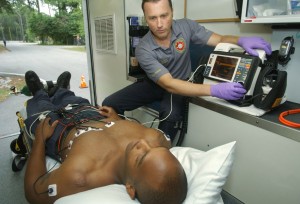 Bias: Former Cox-Duggan relationship, no independent review of Vanguard health systems
Bias: Former Cox-Duggan relationship, no independent review of Vanguard health systems
State law charges Cox’s office with performing an independent review of the transfer of a non-profit to a for-profit before rendering an opinion. How independent that review has been is questionable. Cox worked for several years as an assistant prosecutor when DMC CEO Mike Duggan was Wayne County Prosecutor, but neither man has declared that as a potential conflict of interest.
Both ignored inquiries about that matter to their press representatives John Sellek and Tiffany Jones, respectively.
Cox, who ran unsuccessfully in the Republican primary for governor this year, was endorsed by anti-abortionists. He was also the only Republican to openly support the anti-affirmative action Proposal 2. He has now come out in favor of Arizona’s anti-immigration law. All these positions raise questions about how he will deal a matter involving health care for all.
 Additionally, Cox’s FAQ’s are startlingly cavalier about any independent review of Vanguard’s other health systems.
Additionally, Cox’s FAQ’s are startlingly cavalier about any independent review of Vanguard’s other health systems.
“Our office has interviewed DMC medical professionals and members of DMC’s Board of Trustees and management who visited Baptist Health System in St. Antonio, TX,” his office declares. “VHS has owned this system since 2003. On the basis of these interviews and other publicly-available information, our office is not currently aware of any significant, negative factors. Our office has not undertaken an independent review of VHS’s performance in other states. “
There is however a wealth of critical assessments of Vanguard’s health systems available. Kosman gives a particularly telling summary in “The Buy-Out of America,” beginning withVanguard’s purchase of Louis A. Weiss Memorial Hospital in Chicago in 2002.
“Almost immediately, the new Weiss owner began to lay off staff,” Kosman wrote. “It started with a handful of people in 2002. Then it began to eliminate unfilled positions, and there was a second round of lay-offs the following year. . . .[A]fter the $59 million buy-out, Vanguard needed all the money it could get out of Weiss to pay the debt and produce profits for Vanguard. So it made more staffing cuts. And as the cuts continued, the quality of Weiss’ services began to decline.”
He cited the replacement of nurses in the chemotherapy unit with nursing assistants. Two years later, after a spot check, he reported, the U.S. Department of Health and Human Services placed the hospital on conditional accreditation after an incident in its maternity ward, among other noted violations.
“Losing accreditation would have forced Weiss to shut down,” Kosman said. “In 2007, it closed down its maternity ward.”
Ironically, during the Aug. 18 community forum, Michael Harris, president of AFSCME Local 101, which represents workers at Detroit Receiving Hospital, spoke vehemently in favor of the DMC/Vanguard deal.
Michiganders passed the anti-affirmative action Proposal 2 in 2008, but that proposal applied only to government hiring, not the private sector. Vanguard can set whatever quotas it desires.
Vanguard has given no guarantees that the jobs of current DMC workers will be maintained. They will have to apply for re-hire according to the purchase agreement. A DMC retiree at the forum also questioned whether their pension system will remain intact.
Vanguard’s purchase agreement says it will honor current “unexpired” union contracts, but gives no guarantee regarding what will happen after their expiration dates. In 1980, the union at Detroit General Hospital was busted after its privatization. It took AFSCME four years to re-organize the workers, and then at lower rates of pay and benefits.
“Vanguard’s biggest revenue generator is the Baptist System,” said Kosman. “It consists of five hospitals scattered throughout the city, serving about 30 percent of the population. Dr. Fernando Guerra, San Antonio’s director of health, said care for expectant mothers after the 2003 buyout of the Baptist system fell from about a six to about a three on a scale in which ten in the top quality.”
Kosman says that after Vanguard’s purchase of the Baptist system, pneumonia cases rose 14.3 percent in three years in the hospital chain. As recently as 2008, Kosman writes, the Joint Commission, an independent agency which accredits hospitals, found that in eight of the 11 Vanguard hospitals it inspected nationally, including Baptist, pneumonia care was inferior to other hospitals in the same states.
Kosman reports that in 2007, he spoke again with Dr. Guerra, who told him that after the Baptist chain consulted with him, care improved significantly there.
However, Dr. Joe of the Detroit Medical Society said he has talked to Baptist doctors who still privately question the quality of care there, and that Vanguard has laid off large numbers of staff from its 15 hospitals in other states, including nurses.
“They are working them to death,” he remarked. Dr. Joe said the nurse-to-patient ratio in some Vanguard hospitals approaches 9 to 1, as opposed to a 5 to 1 national average.
Regarding Vanguard’s Phoenix Baptist chain, Kosman quotes Dr. James Kennedy, formerly the medical director there. Kennedy told him that Vanguard’s Nashville officials made drastic cuts in staff immediately after purchasing the chain in 2000. Those cuts included the elimination of nurses on a medical surgical floor, where the nurse-to-patient ratio fell from 1 to 5 to 1 to 10.
In addition to lower levels of pneumonia care, Kosman writes, the Joint Commission also cited poorer heart attack care.
“In heart attack care, seven of 11 Vanguard hospitals it inspected in 2008 performed at levels below most accredited organization in their states. Three were average and one was better than most facilities,” Kosman writes. He also cites a 2008 HealthGrade evaluation of Vanguard’s San Antonio Baptist chain related to chest pain-related operations.
“HealthGrades gave Baptist a one-star (poor) pulmonary embolism (blood clot) rating plus six months,” says Kosman. “Vanguard was the only hospital in its nine-hospital peer group to be given a ‘poor’ rating.”
Kosman interviewed Vanguard’s board vice-chair Keith Pitts, in what he said was one of the most difficult interviews he has ever done.
In “Buy-Out,” he writes, Pitts told him of Vanguard’s new strategy to improve health care.
“Vanguard in 2007 started offering its hospitals’ CEO’s bonuses for which ‘only’ 50 percent of the grading is based on making an earnings threshold, 20 percent is for quality of care, 10 percent for employee satisfaction, 10 percent for physician satisfaction, and 10 percent for patient satisfaction.”
Cox’s office indicates that Pitts is the point person for its dealings with Vanguard.









